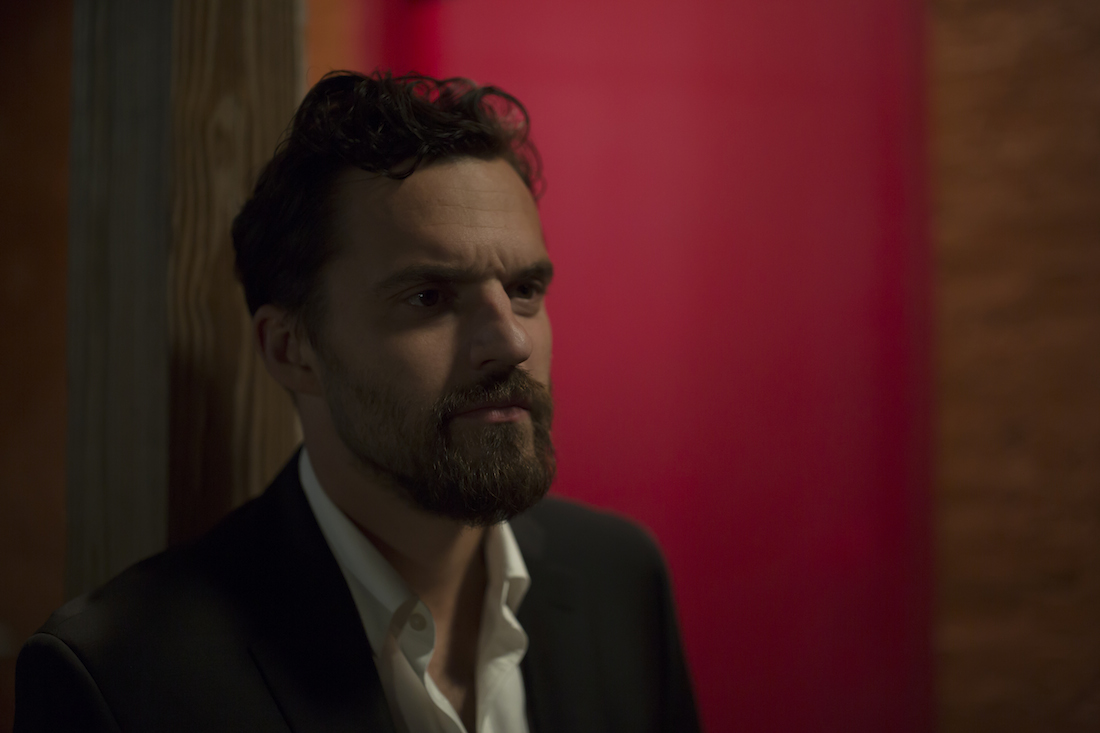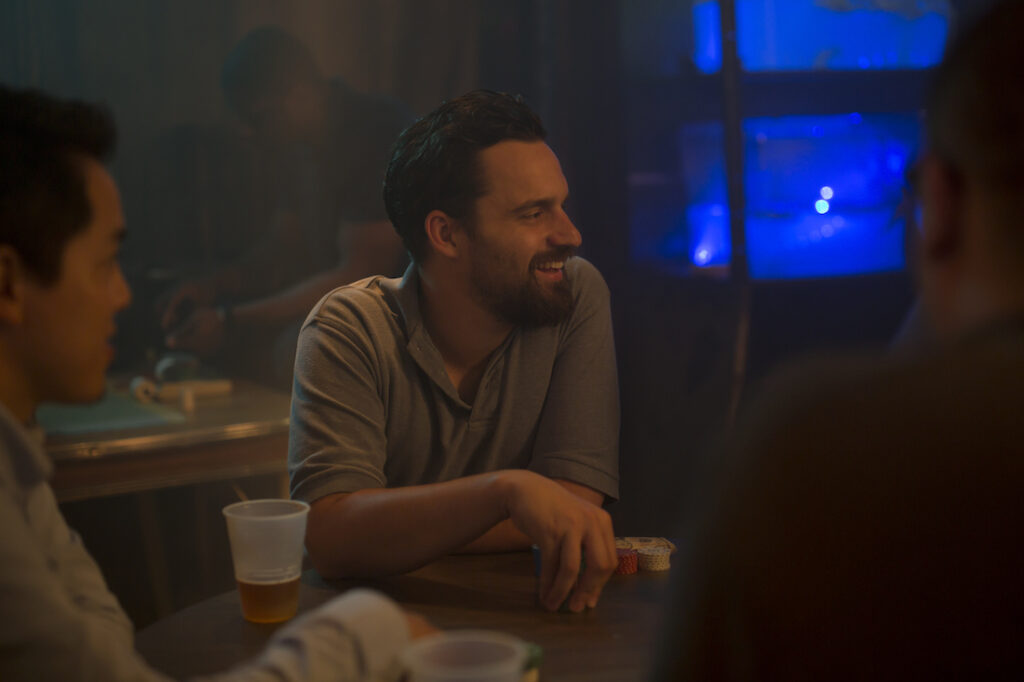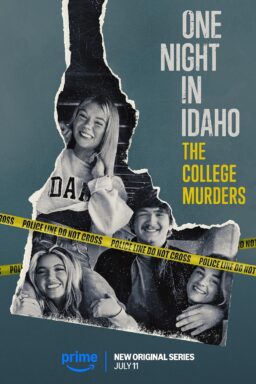Joe Swanberg’s “Win It All” is the story of a lovable Chicago loser named Eddie who has a bit of a gambling problem. When we meet him, he has a life balance of scraping by as a parking attendant for Cubs games, gambling in Chinatown at night and distancing himself from his brother (played by Joe Lo Truglio), who wants to get him involved with the family landscaping business. But when Eddie is trusted with a lot of money by a convict, the compulsive gambler quickly loses all of it and needs to get it back, quick. Along the way he receives amused words of advice from the gambling addiction sponsor he’s previously lost touch with (Keegan Michael Key) and finds someone worth getting his act together for, a woman named Eva (Aislinn Derbez). Like a lo-fi and lighter take on films like “California Split” or “The Gambler,” this venture is possibly Swanberg’s most narrative-driven movie ever, taking place throughout Chicago and with Johnson’s charismatic, endearing and possibly hopeless schlub front and center.
Johnson co-wrote and produced the story with Swanberg, their second script collaboration after “Digging for Fire” and third as an actor and director (“Drinking Buddies”). “Win It All” (now streaming on Netflix) marks a major star vehicle for Johnson, who has previously played supporting roles in the likes of “Safety Not Guaranteed,” “Jurassic World” and as amicable old-soul and love interest Nick on Fox’s hilarious show “New Girl.” He also voices Grouchy Smurf in what one could call the exact opposite of a Swanberg film, “Smurfs: The Lost Village,” also opening this weekend.
RogerEbert.com spoke with Johnson about “Win It All,” his experimental collaborations with Swanberg, his interest in being a part of the new way movies are made and more.
The story of “Win It All” is certainly interesting to come from a rising actor who has hit many successes [“Jurassic World,” “New Girl”] along the way. What does luck mean to you as a person, and also as a professional in a competitive business?
I’m not a big believer in luck. The showrunner for “The Walking Dead,” Scott Gimple—to be a name-dropper—he and I are old friends, and we have had a long-standing battle of how much this business is about luck, and how much it is about grinding and hard work and being in the right place and skill. I personally am not a big believer in terms of gambling or anything. I think if you’re good with cards, you can get lucky once in a while, but the truth is that if you’re a good poker player, and you sit at the table long enough you’re probably going to come out on top. And I feel that way with most things.
So, my reason to do “Win It All” was less my interest about luck, and more about a character who is caught in a gambling addiction, who falls in love, who’s in a situation where they might want to get out of their own way.
There are a lot of gambling movies that go to these dark places, most recently when Mark Wahlberg lost all that weight for “The Gambler” to portray how dire things have become. But “Win It All” has the ability to not be too dark about a gambling addiction but also not be too slight. But I’m curious as to how you came to balance that aspect, or what you were thinking about with Joe.
The casino world and the underground casino world is a world that I’ve dabbled in, and I know it. And it feels like the movie casino world is like, the guys are kind of cool and rough around the edges and hit this unbelievably dark bottom for that person to get out. And I wanted to exist in a slightly different place. I love gambling movies; “California Split” is one of my all-time favorites, and I love the roles of these places. But I like to make movies that are entertaining for people and I like them to be a little bit lighter and a little bit of fun. It’s the kind of movie that I want to watch right now. I wanted to make a gambling movie because I love gambling movies, but I also wanted to make it a romantic comedy that would make you laugh, and I wanted you to like the characters. And if Joe [Swanberg] and I went too far deep into darkness, I don’t think we’d be able to pull ourselves out. And I think the ending, I wanted it to be a big, fun ending. It was a delicate balance that we talked a lot about as we were writing and creating the story.
Given that this movie is arguably slightly more narrative driven than “Digging for Fire,” was your writing process with Joe significantly different?
This and “Digging for Fire” were like opposite experiences as writers together. What we did with “Digging for Fire,” Joe and I talked about this story where a guy was digging for a body in his backyard. Because that was based off a true story, where there were bones in my backyard of the first house I was living in, and a bunch of friends and I went looking for that body. And we said, “There’s a world here. But what if we just really open it up, and each actor that came in we allowed them to be a part of the collaboration?” And we kind of formed that story as we went. There’s a lot that I really loved about that process, but there was a lack of control that I didn’t love. And so on this one, we wanted to control the story, and I really wanted to control the story more and see how that felt working with Joe. Half of the script was dialogue, Keegan Michael Key and Joe Lo Truglio are they’re allowed to say what they wanted to say. But there was still the ability to stay on story.

Did you have to push Joe in that way of being more story driven, or was he already interested in that?
This is our third time working together, and we like the idea of experimenting with our style of working together, to find the thing that works best for both of us. So this one started off like an experiment—do we enjoy working like this? When we were on set we got more coverage than we usually do, and we did more takes than we usually do. But it was about partly finding the process that works best. I really enjoyed having that. I don’t think I’ll do another movie that has less story because I do like the story, so I think i’ll want to push further into the script. But it was a really pleasurable experience. And I really love the movie too, so it’s an easy one to push because I believe in it.
Has it been a learning process for you as a writer, then? Can we expect more scripts from you in the future?
Yeah, it’s interesting. I went to NYU for writing, so my upbringing is actually, I started off as a writer, I was getting developmental health. I sold a bunch of scripts as a writer, but nobody has ever seen them, because I’d get notes from an executive and then they’d pass on it. But I still did a year and a half of writing. So, what I love about Joe is that if you have a script, and he likes it and I like it, let’s just make it. There’s no outside executive because we’re financing.
Do you think that’s why an entire roster of actors like working with him? I’m curious from your perspective as an actor, if you could explain why so many people of such huge names love working on Joe Swanberg movies.
Totally. I think there’s a type of actor who is going to really love this, and there’s a type of actor who won’t love it. And the type of actor who won’t love it might be more of the actor who is really looking for a director who knows specifically, exactly what they want. And then your job as an actor is to say the lines in the way that you are being directed and be technically perfect. And there’s a lot of actors who really love that and who are really good at that. Joe wants more from his actors, he wants you to be a part of the discussion. If these are your lines, he wants you to know why you’re saying that, and for you to create why you’re saying that. As an actor who likes to have control, and that’s what I like to have and I like to have freedom, Joe really gives that to you as long as you are performing in a way that he thinks is servicing his project. And so when I talk to another actor who loves working with Swanberg, we immediately understand where the other guy is at.

How much of it do you think is casting by personality? There’s a free-flowing idea to character in his movies, and for his audience that I think it creates an idea of “How much are they actually like this?” Or can you dispel something about that notion?
I think it always depends on the project. And talking about “Win It All,” there’s no part of my relationship with Keegan Michael Key that he feels like a sponsor to me, that he’s mad at my actions, that’s not in our dynamic. Joe Lo Truglio and I have become friends but there’s no brotherly vibe and there’s no feelings that he’s ever been worried about me. So I kind of get what people say, when you hear the word improv you’re thinking people are playing themselves. And when it comes to the TV show it’s like, “Are you just like Nick?” Well no, I don’t live on a soundstage with professional actors, but it is me doing it and I do improvise jokes. My rhythm is similar to Nick because it’s me saying it, but no. Joe is married with kids, I’m married with kids. And Jess [Zooey Deschanel’s character] and Nick aren’t the real thing. But we can play those characters! But I don’t see the connection, but I know a lot of people do.
We have this idea of who you are, just based on watching you only as an actor and you have an image from the roles we see you do. And you’re even in “Smurfs: The Lost Village” this weekend, voicing Grouchy Smurf. Which is like who Nick would voice if he had to voice a Smurf.
Well, that’s because I got cast because they’re fans of “New Girl”! That’s what I mean.

Do you think about your image, especially with something like “New Girl,” like when you’re creating a romantic comedy type? Or am I overthinking that?
No, I don’t think you’re overthinking. I personally don’t think about it. But I know exactly what you mean, because there is a way I could do something where there is a target audience for “New Girl” where I could cater to, but I actually don’t. And I have actually given it a lot of thought in terms of the work I do and the work I create. And in terms of “Win It All,” I want to get in the spot of my career where I love the work that I’m doing, and if the critics or the fans don’t, then that’s unfortunate. But I’m not doing it for other than this is the kind of movie that I want to make, and I hope that everybody likes it. And “Win It All” really feels to be that film, where we’re really lucky the critics have been really warm and I hope people check it out, but even before when Joe and I watched the final cut together, we gave each other a big hug. We were so happy with it. That’s what I’m really looking to get in terms of this new way of making movies. You can make a movie that can have a home that doesn’t have to be a hundred-million-dollar investment from the studios, to have to do test screenings to see if everybody likes every moment. If somebody doesn’t like it that’s fine, and if they really hate what I do there’s somebody else that they can watch. And a lot of them are 5’10″ white guys with small heads! There’s a lot of options!
But you’ve got to keep working then, because it’s not a business about luck, as you say. You have to keep fighting those other white guys.
Yeah, that’s right. Or work together! We’re going to make a movie with a bunch of 5’10″ white guys. It would be called “Roughly 185 Pounds.”












